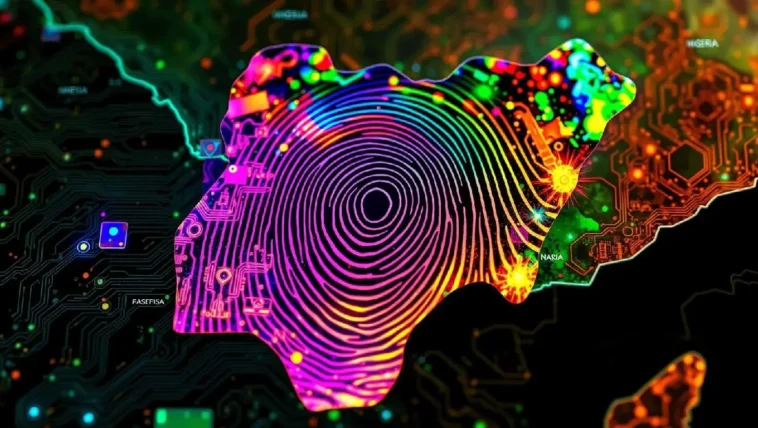Nigeria Biometric Fintech
Nigeria’s Fintech Revolution: Biometrics Boost Financial Inclusion
Nigeria Biometric Fintech is revolutionizing financial access for millions, bridging the gap between underserved communities and essential banking services.Nigeria’s Fintech Revolution: How Biometrics are Bridging the Financial Inclusion Gap
Nigeria Biometric Fintech is not just a buzzword; it’s a rapidly unfolding reality, reshaping the financial landscape for millions. Imagine a Nigeria where access to banking isn’t limited by paperwork, distance, or literacy. This vision is becoming increasingly tangible thanks to the innovative application of biometric technology.
For years, a significant portion of the Nigerian population has been excluded from the formal financial system. Traditional banking requirements can be daunting, especially for those in rural communities or without formal identification. But now, biometrics are stepping in to dismantle these barriers, offering a secure, accessible, and reliable pathway to financial inclusion.
The recent order received by NEXT Biometrics for its FAP 20 fingerprint sensors is a key indicator of this transformative shift. This isn’t just about technology; it’s about empowerment, economic growth, and a more equitable future for Nigeria. Let’s delve into how this revolution is unfolding.
Unlocking Financial Access: The Biometric Breakthrough in Nigeria
The heart of Nigeria’s financial inclusion problem lies in accessibility. Traditional banking systems often require extensive documentation, credit history, and a physical presence, effectively excluding a large segment of the population. Consider the “unbanked” – those without access to formal banking services – who often rely on informal, and sometimes unreliable, methods of saving and transacting.
Biometrics offer a game-changing solution by providing a secure and reliable means of identification and verification. Fingerprint scanning, facial recognition, and other biometric technologies can bypass the need for traditional documentation, making financial services accessible to those who previously couldn’t participate. This is particularly crucial in rural areas where access to banking infrastructure is limited.
Moreover, biometric systems can enhance trust and security in financial transactions. By verifying identities through unique biological traits, these systems reduce the risk of fraud and identity theft, fostering greater confidence in the financial system. This is particularly important in a country where trust in financial institutions may be low due to past experiences.
Think of a rural farmer, previously unable to secure a loan due to lack of collateral or formal identification, now empowered to access credit using their fingerprint. This is the promise of Nigeria Biometric Fintech – a future where financial services are accessible to all, regardless of their background or location.
NEXT Biometrics’ Nigerian Deal: A Closer Look at the FAP 20 Sensor
The NOK 1.7 million order secured by NEXT Biometrics for its FAP 20 fingerprint sensors marks a significant milestone in Nigeria’s biometric journey. But what makes this particular sensor so important? The FAP 20 is designed for high-security applications, offering a robust and reliable means of fingerprint capture even in challenging environments.
Nigeria’s diverse climate and geographical conditions demand technology that can withstand extreme temperatures, humidity, and dusty conditions. The FAP 20 sensor is built to meet these demands, ensuring consistent performance regardless of the environment. Its portability and power efficiency also make it ideal for field operations, allowing for biometric enrollment in remote communities.
The FAP 20 isn’t just about hardware; it’s about the software and algorithms that power it. These advanced algorithms ensure accurate and reliable fingerprint matching, minimizing the risk of false positives or negatives. This is crucial for maintaining the integrity of the financial system and preventing fraud.
This deal signifies more than just a business transaction; it represents a commitment to providing Nigeria with the tools it needs to build a more inclusive and secure financial system. It’s a vote of confidence in Nigeria’s potential and a recognition of the transformative power of biometric technology.
Beyond the Hype: How Biometrics Tackle Real-World Challenges in Nigeria
While the potential of biometrics is undeniable, implementing these systems in Nigeria is not without its challenges. Infrastructure limitations, such as unreliable internet connectivity and power supply, can hinder the deployment and operation of biometric devices, especially in rural areas.
Data security is another critical concern. Biometric data is highly sensitive and must be protected from unauthorized access and misuse. Robust security measures, including encryption and access controls, are essential to safeguard this data and maintain public trust. The lack of adequate infrastructure and expertise in some areas can make this a daunting task.
User adoption is also crucial for the success of any biometric initiative. Some individuals may be hesitant to provide their biometric data due to privacy concerns or lack of awareness about the benefits. Education and awareness campaigns are needed to address these concerns and promote user acceptance.
Think of the elderly woman in a remote village, unfamiliar with technology and wary of providing her fingerprint. Overcoming this hesitancy requires building trust, demonstrating the benefits, and ensuring that the technology is user-friendly and accessible to all.
From SIM Cards to Safety Nets: The Expanding Applications of Biometrics
Biometrics are not just revolutionizing banking; they’re transforming various aspects of Nigerian life. One prominent example is SIM card registration. The Nigerian Communications Commission (NCC) has mandated the use of biometric data to register SIM cards, helping to combat fraud, reduce crime, and improve national security.
Biometrics are also playing a crucial role in the distribution of government safety net programs. By verifying the identities of beneficiaries through fingerprint scanning or facial recognition, these systems ensure that aid reaches the intended recipients, minimizing fraud and corruption. This is particularly important in a country where resources are often limited and vulnerable to misuse.
Furthermore, biometrics are being explored for voter identification, helping to prevent electoral fraud and ensure fair and transparent elections. By verifying voters’ identities at polling stations, biometric systems can reduce the risk of multiple registrations and impersonation.
From securing mobile communications to ensuring fair elections, biometrics are proving to be a versatile tool for addressing a wide range of challenges in Nigeria. This expanding application highlights the transformative potential of this technology to improve governance, security, and social welfare.
The Players Behind the Progress: Key Stakeholders in Nigeria’s Biometric Ecosystem
Nigeria’s biometric revolution is not the work of a single entity; it’s a collaborative effort involving various stakeholders. The National Identity Management Commission (NIMC) plays a central role in developing and implementing the national identity system, which serves as the foundation for many biometric initiatives.
Private companies like NEXT Biometrics and Integrated Biometrics are providing the technology and expertise needed to deploy and operate biometric systems. These companies are working closely with government agencies and financial institutions to develop customized solutions that meet Nigeria’s specific needs.
International organizations like the World Bank are providing funding and technical assistance to support Nigeria’s financial inclusion efforts. These organizations recognize the transformative potential of biometrics and are committed to helping Nigeria achieve its goals.
The success of Nigeria’s biometric revolution depends on the continued collaboration and coordination of these key stakeholders. By working together, they can overcome challenges, leverage resources, and ensure that biometrics are used to promote inclusive and sustainable development.
Nigeria vs. the World: A Global Perspective on Biometric Financial Inclusion
Nigeria is not alone in its pursuit of biometric financial inclusion. Countries around the world are exploring the potential of this technology to expand access to financial services, reduce poverty, and promote economic growth. In India, the Aadhaar program has enrolled over a billion people in a biometric identification system, enabling access to various government services and financial products.
In Uruguay, NEXT Biometrics has deployed its fingerprint sensors for secure payment applications, demonstrating the global demand for this technology. These examples highlight the growing recognition of biometrics as a powerful tool for promoting financial inclusion and social development.
While Nigeria can learn from the experiences of other countries, it also has its own unique challenges and opportunities. Nigeria’s diverse population, complex regulatory environment, and infrastructure limitations require customized solutions that are tailored to its specific context.
By learning from both successes and failures around the world, Nigeria can chart its own path to biometric financial inclusion, leveraging its strengths and addressing its weaknesses to achieve its development goals.
The Dark Side of Digits: Addressing Fraud and Security Risks in Biometric Systems
While biometrics offer enhanced security, they are not immune to risks. Identity theft remains a concern, as criminals may attempt to steal or replicate biometric data to gain unauthorized access to financial accounts. Data breaches can also expose sensitive biometric information, putting individuals at risk of fraud and identity theft.
Algorithmic bias is another potential issue. Biometric algorithms may be less accurate for certain demographic groups, leading to unfair or discriminatory outcomes. For example, facial recognition systems have been shown to be less accurate for people of color.
Addressing these risks requires a multi-faceted approach, including robust security measures, data protection regulations, and ongoing monitoring and evaluation. It’s also crucial to ensure that biometric algorithms are fair and unbiased, and that individuals have the right to access and correct their biometric data.
By proactively addressing these risks, Nigeria can ensure that biometrics are used responsibly and ethically, promoting trust and confidence in the financial system.
Policy and Regulation: Shaping the Future of Biometric Financial Inclusion
Government policies and regulations play a crucial role in shaping the future of biometric financial inclusion in Nigeria. Clear and comprehensive data protection laws are needed to safeguard biometric data and protect individuals’ privacy rights. These laws should outline the collection, storage, and use of biometric data, and establish penalties for violations.
Regulations are also needed to ensure that biometric systems are fair and unbiased, and that individuals have the right to access and correct their biometric data. These regulations should address issues such as algorithmic bias, data security, and user consent.
Furthermore, the government can promote biometric financial inclusion by providing incentives for financial institutions to adopt biometric technologies, and by investing in the infrastructure needed to support these systems. This includes improving internet connectivity, ensuring reliable power supply, and promoting digital literacy.
By creating a supportive policy and regulatory environment, Nigeria can unlock the full potential of biometrics to promote financial inclusion and sustainable development.
The Mobile Money Revolution: How Biometrics are Transforming Payments
The convergence of biometrics and mobile money is revolutionizing the way Nigerians transact. Mobile money platforms allow individuals to send and receive payments using their mobile phones, bypassing the need for traditional bank accounts. By integrating biometrics into these platforms, transactions can be made more secure and convenient.
Imagine a market vendor in Lagos, accepting payments from customers using their fingerprints. This is the reality of biometric mobile money – a seamless and secure way to transact, even without a bank account or a smartphone. This is particularly beneficial for the unbanked population, who often rely on cash transactions and are vulnerable to theft and fraud.
Biometric mobile money can also reduce the cost of transactions, making it more affordable for low-income individuals. By eliminating the need for intermediaries, these platforms can lower fees and commissions, putting more money in the hands of those who need it most.
As mobile money continues to gain traction in Nigeria, the integration of biometrics will play a crucial role in ensuring its security, convenience, and accessibility, driving greater financial inclusion and economic empowerment.
Beyond 2025: The Long-Term Vision for Biometric Financial Inclusion in Nigeria
Looking ahead, the future of biometric financial inclusion in Nigeria is bright. Emerging technologies, such as blockchain and artificial intelligence, have the potential to further enhance the security, efficiency, and accessibility of biometric systems. Blockchain can provide a secure and transparent platform for managing biometric data, while AI can be used to improve the accuracy and reliability of biometric algorithms.
As the regulatory landscape evolves, it’s crucial to ensure that policies and regulations keep pace with technological advancements. This includes addressing emerging challenges such as data privacy, algorithmic bias, and cybersecurity threats.
Ultimately, the long-term vision for biometric financial inclusion in Nigeria is one of greater social and economic equity. By providing access to financial services for all, regardless of their background or location, biometrics can help to reduce poverty, promote economic growth, and create a more inclusive society.
The journey towards biometric financial inclusion is ongoing, but the progress made so far is encouraging. With continued innovation, collaboration, and a commitment to ethical and responsible implementation, Nigeria can unlock the full potential of biometrics to transform its financial landscape and improve the lives of its citizens. Let the conversation begin. Share your thoughts and experiences with biometric technology in Nigeria in the comments below!
As Nigeria continues its journey towards greater financial inclusion, the technology powering this revolution becomes increasingly vital. The fingerprint scanners at the heart of these biometric systems are not just tools; they are gateways to opportunity, security, and economic empowerment. From bustling urban centers to remote rural villages, these devices are making a tangible difference in the lives of everyday Nigerians.
If you’re intrigued by the potential of fingerprint scanner technology and want to explore how it can be applied in various settings, you’re in the right place. Whether you’re a business owner looking to enhance security, an entrepreneur seeking innovative solutions, or simply a tech enthusiast eager to learn more, the following selection of fingerprint scanners offers a range of options to suit your needs. Dive in to discover the power and versatility of this transformative technology. Don’t forget to share your thoughts and experiences in the comments below, and subscribe to the Naija NewsBurrow Network newsletter for the latest updates!
Shop Products On Amazon
Shop Products on Ebay









Trending Similar Stories in the News
NEXT Biometrics Receives Order for Nigerian Financial Inclusion Project FF News | Fintech Finance...
Lack of liveness detection costs Nigeria’s financial institutions millions of Naira in fraud Biometric Update...
Trending Videos of Nigeria Biometric Fintech
9 Best Mobile Money Services In Nigeria
Similar Popular Articles
#NigeriaFintech #BiometricTech #FinancialInclusion #AfricanTech #FintechInnovation
Nigeria, Fintech, Biometrics, Financial Inclusion, Technology






💬 What’s your take? Drop a comment below! ⬇️
#BreakingNews #LatestUpdate #StayInformed
📖 Read More: https://honeydew-zebra-306959.hostingersite.com/nigeria-biometric-fintech-revolution/
Nigeria’s Fintech Revolution: Biometrics Boost Financial Inclusion
💬 What’s your take? Drop a comment below! ⬇️
#BreakingNews #LatestUpdate #StayInformed
📖 Read More: https://tinyurl.com/2akeh27p